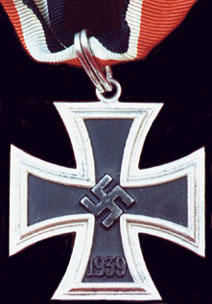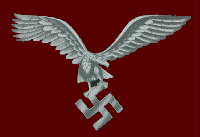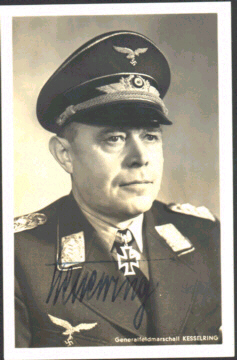|
|
|
 |
 |
Galland's Luftwaffe |
 |
 |
Field Marshal
Albrecht Kesselring
1885-.-1960
 |
| Kesselring is considered one of
the half dozen most talented Generals of World War 11. Like Halder and Jodl he was by origin a Barvarian artillery officer but had transferred in 1933 to the embryo Luftwaffe. He commanded air fleets in the campaigns over Poland and Belgium in 1939 and 1940, and during the Battle of Britain commanded the Luftflotte 11 which was stationed in north east France and the Low Countries. His air fleet was on the verge of knocking out Fighter Command when Goering decided that the bombing offensive be diverted to London but aircraft losses were excessive and their failure led to the indefinite postponement of Operation Sealion. In 1941 Kesselring was sent to Itily and made Commander in Chief, sharing with Rommel the direction of the North African campaign. In rome where his head quarters was situated, Kesselring often lost touch with events on the Front but his constant theme was the need was the need for more aircraft in the Mediterranean which would have been decisive. The lack of air cover speeded up the withdrawal from North Africa as it became impossible to keep the troops adequately supplied. However once fighting shifted to Sicily and Itily Kesselring came into his own and conducted a brilliant defense of the peninsula. Without adequate reserves in Itily he held up the Allies in Sicilt by gradually moving his line back into the northeast corner of the isle. Thus giving the Allies no room to maneuver. In Itily his persistent defence of the Gustav or Winter Line gave rise to Frustration in the Allied camp and even after their eventual berakthrough he was able to halt General Alexander's forces south of the Po. In March 1945 hitler transferred him to the west to replace Rundstetd an Commander in Chief but the Front there was beyond holding. He eventually negotiated surrender with the americans but he remained loyal to Hitler until he had news of his death. Imprissioned in Itily after the war he was tried for war crimes. His death sentence was commuted to life imprisonment. Kesselring was released in 1952 due to ill health. |